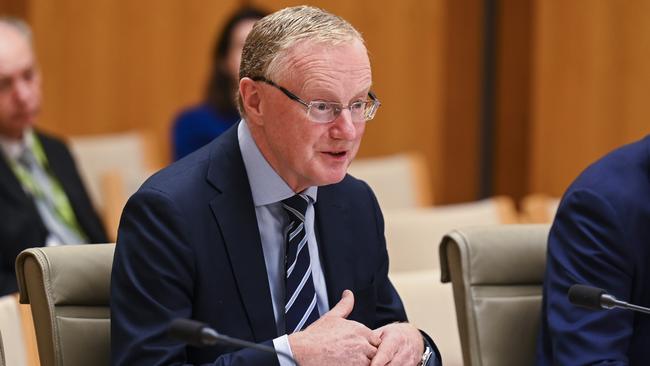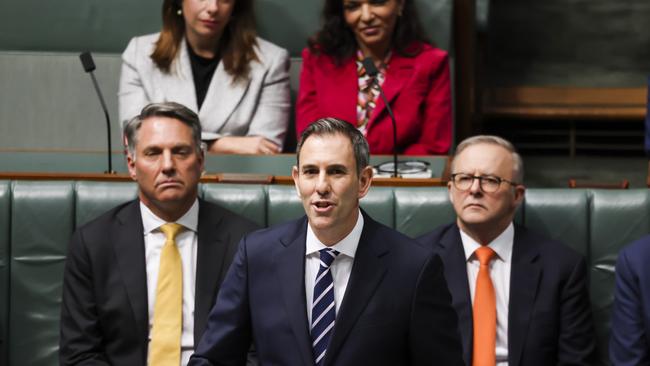RBA to ban PwC after ‘unacceptable’ tax leaks, RBA governor Philip Lowe says
Governor Philip Lowe says the accounting and consulting giant's use of private tax information for commercial gain is ‘wrong’ and ‘unacceptable’.
The Reserve Bank will ban the use of PwC Australia, with governor Philip Lowe labelling the behaviour of the accounting and consulting firm as “unacceptable” and those responsible should face serious consequences.
“The use of private information for this sort of commercial gain is wrong, it destroys trust … it’s unacceptable,” Dr Lowe said during his appearance before the Senate Economics Committee on Wednesday.
The RBA however does have an ongoing consulting agreement with PwC that was entered into last year.
Dr Lowe said the review is looking at auditing potential underpayments of entitlements of people leaving the bank, with the PwC contract worth around $400,000.
“PwC are going to continue to provide services under this current audit contract. It doesn’t make sense to change,” Dr Lowe said.
“But we’ve taken the decision to enter no new contracts with PwC until a satisfactory response has been forthcoming. And a satisfactory response includes both complete transparency and accountability for those involved, and we will not be seeking further services until that happens.”
Dr Lowe said he is “100 per cent confident” that the bank’s auditor, PwC, does not have access to sensitive information relating to monetary policy.
Treasury last week referred PwC to the Federal Police for potential criminal charges after the firm used confidential multinational tax briefings with the department to enrich its clients.
“I want to assure you that they (PwC) don’t have access to the type of material that you are worried about,” Dr Lowe said.
“It’s very specific, and they have access to the systems and processes they need to in order to audit those systems and we are very careful about that,” he said.
Dr Lowe also called for the PwC partners involved with allegedly misusing confidential tax information “to be identified” and held accountable for their actions.

Dr Lowe, whose present term expires on September 17, also said the RBA is “not engaged in a scare campaign” on interest rates.
The central bank has raised rates 11 times in a year to smash inflation, which has risen to 6.8 per cent over the 12 months to April, due in part to higher petrol prices following the restoration of the fuel excise.
“We are trying to remind people of our seriousness about getting inflation down,” he said.
“If we have got an inflation mentality … inflation becomes entrenched … it will lead to higher interest rates and higher unemployment … if we had not increased interest rates as we had, the result would be even higher interest rates and unemployment.
“We will do what’s necessary to make sure inflation does not stay high for too long.”
The RBA is particularly focused on unit labour costs, he said.
“The problem is weak productivity growth,” Dr Lowe said.
“There has been no growth in productivity for the last three years.
“It’s a problem for the country, and it's a problem for the inflation outlook as well.
“If unit labour cost growth is 3.5 or 4 per cent, it’s very hard to have inflation of 2.5 per cent.”
Dr Lowe said the additional spending in the May budget had not added to inflationary pressures, echoing comments from Treasury secretary Steven Kennedy a day before.
Dr Lowe said the budget settings were “broadly neutral”, and that monetary policy was contractionary. He said the May budget – which included $14.6bn in cost of living support measures – had not changed the bank’s forecasts for consumer price growth.

“The budget, largely through the electricity price package, is taking pressure off inflation,” Dr Lowe said.
That included a 0.5 percentage point decrease in the coming financial year as a result of Labor’s energy price caps, and another 0.25ppt reduction as a result of power bill subsidies.
A range of private sector economists have raised concerns that the additional spending from the May budget would add to demand and consumer prices, and could lead to interest rates staying higher than would otherwise have been the case.
But Dr Lowe played down these risks, saying that in the context of a $2.3 trillion economy, “the additional spending in the budget hasn’t shifted the dial”.
Dr Lowe said he doesn’t support having economists dominate the yet-to-be formed monetary policy board proposed by the recent external review of the RBA.
He said it would be a backward step to have only economists on the board.
Dr Lowe said the RBA already has plenty of economists, and what he values is input from board members with experience in private business and labour markets.





To join the conversation, please log in. Don't have an account? Register
Join the conversation, you are commenting as Logout